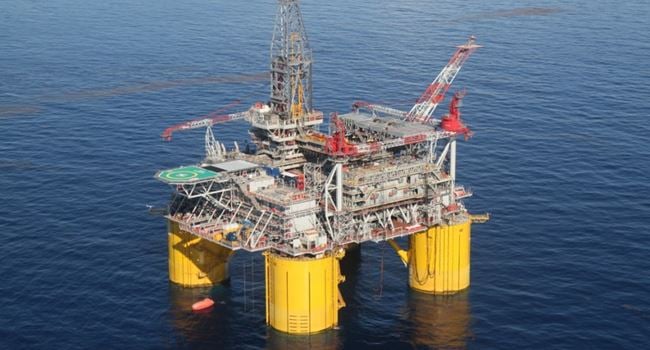This photo is not GHL's oil rig. It's only used for illustrative purposes.
The Organisation of the Petroleum Exporting Countries (OPEC) says Nigeria’s oil production declined in July 2023, making the country the third largest oil producer in Africa.
In its latest monthly report for August, the global oil cartel said Nigeria’s oil production decreased to 1.081 million barrels per day (bpd) in July 2023.
In the same month, Libya produced 1.173 million bpd, Angola produced 1.149 million bpd, and Algeria produced 955,000 barrels bpd, respectively.
According to the report, in June 2023, Nigeria’s oil output, which stood at 1.249 million bpd, surpassed Libya and Angola — making it Africa’s largest producer.
Advertisement
However, the country’s production suffered a huge decline of about 168,000 barrels bdp in the following month, falling two places to the third position.
“Total OPEC-13 crude oil production averaged 27.31 million bpd in July 2023. Lower by 836,000 bpd month-on-month,” the report said.
“Crude oil output production declined mainly in Saudi Arabia, Libya, and Nigeria, while production in Iran, Angola and Iraq increased.”
Advertisement
The OPEC report further said world oil demand in 2023 was expected to grow by 2.4 million bpd, but has remained unchanged from July’s assessment.
NON-OPEC OIL SUPPLY TO EXPAND BY 1.5MILLION BPD IN 2023
Meanwhile, the report said non-OPEC oil supply is expected to expand by 1.5 million bpd in 2023.
This, the group said, is a slight upward revision from the previous assessment of 1.4 million bpd.
Advertisement
But for 2024, non-OPEC oil production is projected to grow by 1.4 million bpd, unchanged from the previous assessment, according to the report.
“For 2024, the main drivers for liquids supply growth are expected to be the U.S, Canada, Guyana, Brazil, Norway and Kazakhstan, mainly due to existing project ramp-ups,” it added.
“The largest declines are expected from Mexico and Azerbaijan.
“OPEC natural gas liquids (NGLs) and non-conventional liquids are forecast to grow by 46,000 bpd in 2023 to an average of 5.4 million bpd and by another 65,000 bpd to an average of 5.5 million bpd in 2024.”
Advertisement
NIGERIA’S ECONOMY REMAINS AT 2.4%
Speaking on the challenges in Nigeria, OPEC the country’s economic growth in the first quarter (Q1) of 2023 stood at 2.4 percent year-on-year (y-o-y), a decline from 3.6 percent recorded in the fourth quarter (Q4) of 2022.
Advertisement
The oil cartel said the development was an indicator of this year’s anticipated slowdown as high inflation continues to burden Nigeria’s economy.
“Inflation data for June shows an ongoing acceleration, with an annual rate of 22.8 percent y-o-y, following 22.4 percent y-o-y in May and 22.2 percent in April and 22 percent in March,” the report reads.
Advertisement
“Food inflation has been a key factor in this rise, reaching 25.1 percent year-on-year (y-o-y) in June, after 24.8 percent y-o-y in May.
“A combination of factors including conflict, the impact of climate change, population pressures, and the below-average output of the agricultural sector, exacerbated the scarcity of food resources over recent years.”
Advertisement
TheCable reported on the measures that Nigeria’s government intends to implement to address these challenges here and here.
Add a comment





